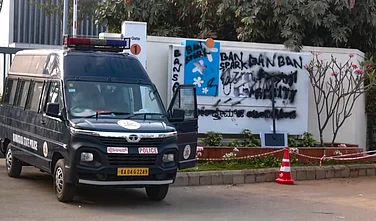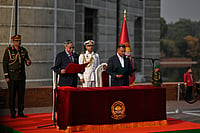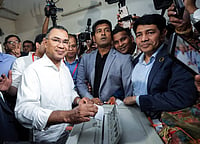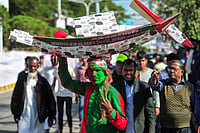“Kadry reshaiut vse,” the Soviet Union’s one-time supreme leader Joseph Stalin’s famous 1935 slogan has been alternately translated into English as ‘cadres decide everything’ on ‘cadres are the key’. The difference is fine but noteworthy.
If the first is to be closer in essence to the original, one might question if it was meant more for lip-service than with real intent for practice. If the second translation is to be considered, there can perhaps be no argument over the fact that cadres are, indeed, the key to political parties. Communist parties worldwide have all been cadre-based parties.
Throughout the 77 years of his life, Gobinda Haldar, a retired industrial worker, had not given much thought to the ideological debates concerning the role of cadres in a communist party. But he has been an ideal cadre for the Communist Party of India (Marxist) in practice—joining the party during a turbulent time in West Bengal in 1970, surviving the difficult years of the last Congress government between 1972 and 1977, and then after a phase of 34 years of his party’s uninterrupted rule, still standing his ground during a decade of the Trinamool Congress (TMC) regime, when his party’s vote share fallen from about 40 per cent to just above 4 per cent.
“My party is my life. It’s in my blood. I cannot imagine a life without the red flag. I can’t think of a day without being at the party office,” Haldar says, his voice loaded with conviction.
“It’s the communist party that taught me to fight for the rights of the poor people and prioritise issues over individuals. The party taught me collective decision-making…” The list becomes endless when he starts talking of the role of the party in his life.
In communist parties, a small section of the supporters actually become members of the party, while most others remain involved in different mass organisations—for students, farmers, workers, youth and women, among other sections. A member of the party usually has a greater degree of involvement and commitment than those involved in mass organisations.
The essential differences between cadre-based parties and mass-based parties are that the former are usually well-structured from the bottom to the top, survive on their ideological and structural basis rather than the charisma of individual leaders, and usually have internal elections at regular intervals to choose the leadership.
Haldar finds satisfaction in the fact he always accepted every responsibility that his leaders trusted him with. None of his three children became politically active, but he is happy that his wife stood by him when he spent more time for the party than his family. Even in the 2021 assembly election, he served as the party’s agent at a polling booth in Bandapara of Chandrahati area within Saptagram assembly constituency in Hooghly district. A polling agent is the party’s representative inside the polling booth to ensure no foul play is involved in the polling process. At times, polling agents become targets of rival parties.
Haldar was only two and a half years old when, in 1948, his family shifted from Pabna in what was then East Pakistan to Lalbag in Murshidabad district of West Bengal. By the time he was in his late teens, he found himself deeply involved in the refugee rehabilitation movement in Lalbag that was being spearheaded by the left-wing refugee organisation, United Central Refugee Council (UCRC). It marked the beginning of his association with the communist party, back then the undivided Communist Party of India (CPI), which itself was going through a lot of internal turmoil. By the time Haldar shifted to the Tribeni area in Hooghly district in search of work in 1965, the CPI had split and the CPI(Marxist), or the CPI(M), had been born.
Due to previous links with the communist party in the Tribeni-Bansberia area, he became involved in trade union activities, organising workers at the spun pipe industrial unit where he got a job as an industrial worker. By 1970, he had become a member of the CPI(M) —a membership that he has been renewing every year since. He remembers having faced many threats from political opponents—the Congress during 1972-77 and the TMC after 2011. But since he is driven by the cause of fighting for the poor, which he believes only a communist party can, nothing succeeded in stopping him.

“In 2011, just a few days after the seventh Left Front government went out of power, some local rowdies associated with the new ruling party heckled and beat me up in public. I was 66-67 years old at that time. They thought I would go silent. But they did not know me. Despite threats, I served as a polling agent in the 2013 panchayat elections,” says Haldar.
In the CPI(M), members have to take active part in the party’s routine functioning as well as special responsibilities—from organising agitations and overseeing activities of mass organisations to preparing and maintaining voter lists in their respective areas. In his youth, Haldar served the party in many ways—from organising workers under the trade union wing CITU, to building the party’s base in his own locality. During the 1980s and 1990s, he served two terms as a member of the Chandrahati II gram panchayat. At present, too, he makes himself available for every party programme, indoors or outdoors. “He would die of shock and despair if someone asked him to give up his party membership,” Rudra Chakraborty, another CPI(M) member from the area, says jokingly. “A few years ago, he had a bypass surgery. Within two weeks of returning home, he was ready to take part in a street corner rally.”
For his part, Chakraborty, too, has been an ideal cadre. He became a party member in 2009, when the first signs of possible decline of the Left’s three decades’ old regime were becoming visible. For the first time since 1977, the Left had won less than half the Lok Sabha seats in West Bengal—only 15 of 42. Chakraborty, who was drawn to leftist politics during his college years in the late 1990s, believed the CPI(M)-led Buddhadeb Bhattacharjee government was on the right track in pushing for an industrial drive. Two years after he became a member, the government fell. In a matter of just two-three years, the CPI(M) membership dwindled across the state. Many did not renew their membership; some were cancelled by the party as the members had become inactive. But for Chakraborty, a new battle had started in 2011.
ALSO READ: RJD: Time For Reappraisal Of Party Cadres
“Soon after the regime change, local TMC supporters hurled bombs in front of my house. They wanted to terrorise the local party members but we made it a point to keep our local party office open every day. Later, in 2019, miscreants dragged me out of my house and thrashed me. In 2021, on the day of polling for the assembly election, they locked my house from outside early in the morning so that I could not move out,” Chakraborty went on listing what he had to endure in the past decade.
ALSO READ: The Slow And Steady Decline Of BSP
Amidst such political pressure, the party’s support base among the masses was also in a downward spiral since the 2016 assembly election, as reflected by the party’s vote share. “For a member of a community party, despair is the last thing that one can allow. The situation was going from bad to worse for us but I have always been hopeful that the tide will turn,” says Chakraborty.
ALSO READ: The Slow And Steady Decline Of BSP
In West Midnapore district of southwestern Bengal, Sk Ali Azam aka Bablu, has suffered for becoming a CPI(M) cadre. He inherited his love for the party from his father, Sk Abdul Hamid, who was a party member in the 1970s through the party’s farmers’ wing. However, after their home at Soroi area in Keshpur block came under attack from alleged TMC supporters in 2011, he had to leave his village along with his wife, Taslima, and three children and take shelter 25km away in the district headquarters, Midnapore town, where his party helped him find accommodation. He has been living here ever since, working in the party’s trade union wing. “In the past 11 years, I have been implicated in 20 false cases by the district police,” he said, adding that he has not been allowed to vote in any election since 2011.
Nothing could derail his commitment to the party, though. His regular involvement with the party has been in Midnapore town for the past decade but he keeps visiting Keshpur whenever the party has a rally or agitation programme there. A transport worker, Azam became a member of the party in 2012, perhaps among a handful of people in the state who became a new member of the party a year after it lost power. But it’s not power that mattered to him, it’s the party.
“Who else will fight for the oppressed?” Azam asks. His allegiance, he said, is to the party’s flag and the electoral symbol. Nothing else matters.
(This appeared in the print edition as "Red Brigades")
ALSO READ


























